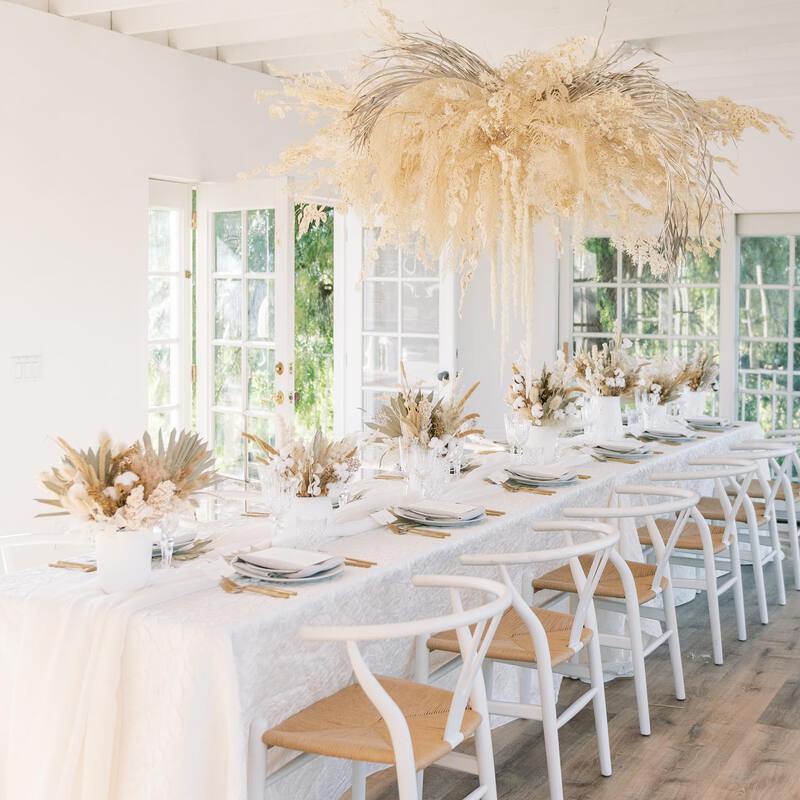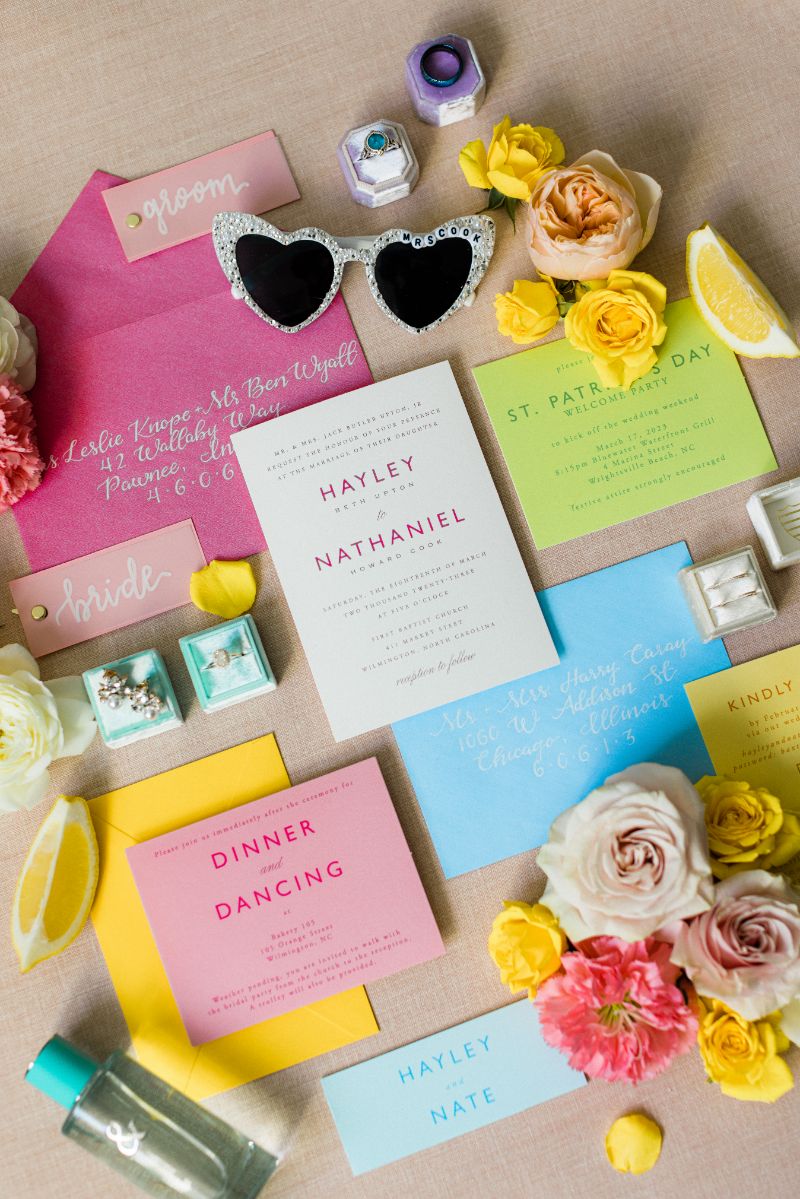When it comes to saving for a wedding, it’s important to be realistic. While you want to host an incredible event for you, your friends, and your family, you also want to keep costs affordable so you’re set up for success in all areas of life.
This is why we created this guide to planning and budgeting for your wedding, as well as how to pay for your wedding and everything it entails. By being organized and setting realistic goals, you can easily save for your dream wedding.

How Much Does a Wedding Cost?
Weddings can cost a wide range. Even though the average wedding in the United States costs around $30,000, weddings can range from $5,000 for a small event to hundreds of thousands of dollars.
Depending on the number of guests, the time of year, the vendor choices, and the location (both venue and city/state/country) there is a lot of variation between weddings, so creating a budget that is realistic and do-able for a couple is the first step in the planning process.
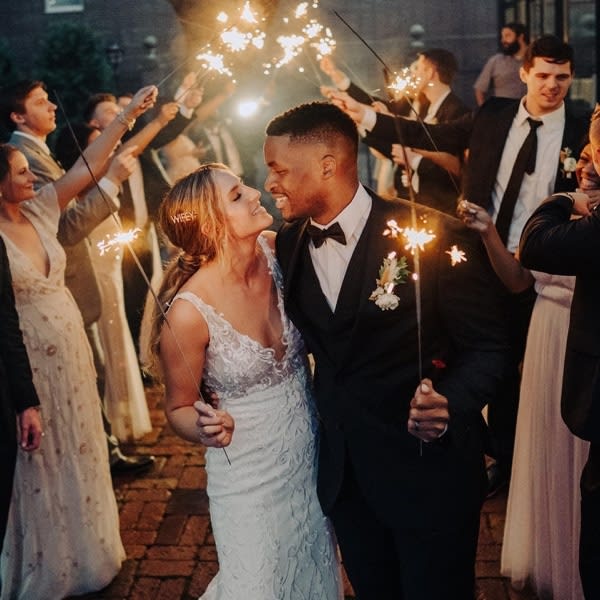
Photo by @tom_thornton_.
How to Save for a Wedding
1. Calculate a wedding budget before you start booking vendors
First thing’s first: make your wedding budget! Decide how much you can afford to spend on the wedding, including all of the expenses that come with it. Check out a wedding planning checklist, speak to friends and family that have had their own weddings, and do some serious research so you include everything and have the right approximate costs.
This will help you know what your financial expectations should be and give you a better idea of whether or not you need to save or borrow money. If the amount seems reasonable, you can start searching for vendors. And if not, try cutting back on some of the expenses until they fit within your budget.
Wedding saving tip: when wedding vendors provide you with estimates, check to see if sales tax is included. If not, do the math yourself using local tax rates to adjust the total amount so that it's accurate.
2. Set priorities with your partner
Make a list of wedding elements that are most important to you, and what is most important to your partner. If you're on the same page with what's important, this should be easy. If not, take some time to figure out what each of you wants and needs for the big day. Once you've got a good idea of what matters most, compare lists with your partner and discuss which priorities will drive your decisions moving forward.
Are you obsessed with flowers, and your partner isn’t? Do you both think it’s worth investing in live music over a DJ? Figuring out where you agree–and where you don’t–can help you make room in your budget for specific items and remove others.
Taking time to discuss the guest list, location, floral arrangements, and photography can help couples establish what are main priorities and where to prioritize those expenses based on needs and wants. If you’ve included a wedding planner in your budget, you can also take some time to ask your wedding planner what can work within your budget.
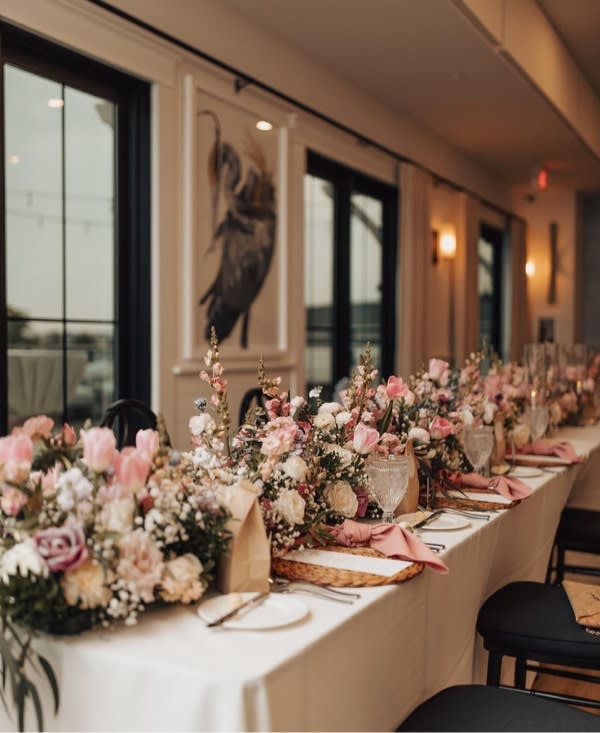
Photo by @photographybydeannamichele.
3. Making a wedding bank account
The first step to saving for a wedding is setting up a wedding savings or checking account. This is not simply opening up another bank account—it's taking time to set up an account in which you can combine all your wedding-related savings and make regular deposits into it.
If you already have an online banking portal, use that for your wedding-related account. If not, there are many apps available that make it easy to manage one or more accounts from your phone or tablet without any extra setup steps. You can even find apps that will automatically transfer small amounts from your checking account into savings at regular intervals, which can be helpful if you want the money but don't want to worry about managing it every month.
If you're still not sure how much money should go into this account and how often, split up your current wedding budget into how many months you have until the event, and make that a goal between the two of you for each month. If you receive an engagement or shower gifts of cash, you can add that in there as well.
Make sure to consider the deadline you need to pay your vendors: some might need deposits, others might be due the day of, others a bit after. While these exact numbers might come later, working them into both your budget and saving schedule is important.
Take these factors into consideration when determining what amount of money should go into your wedding bank account each month so you can stay on track with your budgeting goals.
4. Track all your spending
Tracking your spending (wedding and otherwise) is an important part of getting a handle on your finances. You can use a budget app, spreadsheet, or even just pen and paper to track all your income, savings, debts, and investments.
This will not only help keep your budgeting on track, but will provide clarity into where you might be able to save more for the wedding.
5. Cut back on other expenses
As you get closer to the big day–or well before–you may consider cutting back on other expenses that usually cut into your budget. This is especially true if you're also saving for a wedding or honeymoon.
If you can't afford it all at once, that's completely alright. It’s becoming increasingly common to not take a honeymoon directly after the wedding so they can get one event paid for first.
Start by making a list of what needs to be done and prioritize based on their importance to you and your partner. In most cases, cutting down your budget will require prioritizing your spending and making some sacrifices where necessary.
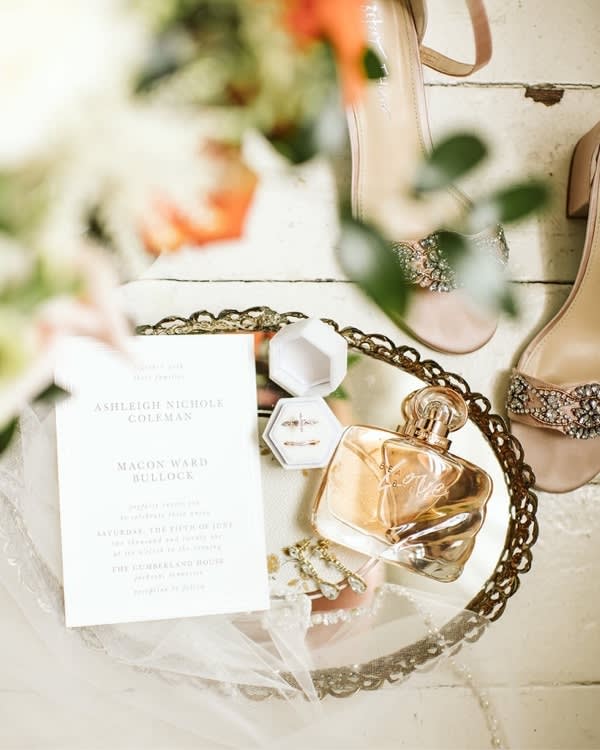
Photo by @carrieellenphoto.
Ways to Save Money on Your Wedding
1. Look for wedding deals & sales
If you're going to splurge on something, it's probably a good idea to find out when the best time to do so is. You'd be surprised how many different wedding vendors offer discounts and deals on their services or products at certain times of year.
For example, wedding dresses are often reduced in price after Christmas and during springtime clearance sales as manufacturers prepare for new collections. Flowers are almost always cheaper during off seasons like winter or fall because there's less demand for them at these times of year.

You can also look for deals on venues. Some venues offer special rates if you book your wedding on a certain day or week of the month (e.g., "Weddings Week"). Others have promotional codes that can get you free upgrades (such as bridal suites) if you notify them ahead of time that your wedding date is coming up soon.
Hint: Take advantage of free address printing. For your wedding stationery like save the dates and wedding invitations, Minted will address your envelopes for free, in a variety of hand-styled fonts and unique designs that match your design. All you need to do is upload your guests' snail-mail addresses, choose recipient addressing and select your guests, and Minted will include complimentary printed envelopes with your order. Plus, your address book will be saved for future post-wedding stationery, like your wedding thank you cards or holiday cards.
Another great option to save on wedding invitations is by choosing All-In-One Wedding Invitations. In this case, the RSVP card is attached to the invitation, which your guests can then detach and return. This is a more affordable option than the traditional wedding invitation format, and makes everything easier for both you and your guests.
You could also try Petite Wedding Invitations–another affordable option that still includes everything you need. Petite wedding invitations keep the invitation and envelope size smaller than a standard invitation, which helps lower printing costs and postage.
And if you don’t see a deal listed–don’t be afraid to ask. The savings can be worth it!
2. Review the guest list
The guest list is one of the first things you should consider when planning a wedding. The number of people you invite should be determined by how much money you want to spend on the wedding.
If you are looking to cut expenses, most of that will come from your guest list size and venue–which also depends on your number of guests. (Read our stress-free guide to creating your wedding guest list.)
3. Use rewards programs
Use rewards programs to earn cash back or other rewards on purchases you’re already making. You can use them to pay for your wedding and get the points back in the form of coupons, gift cards, or travel miles.
A few things to keep in mind:
- Rewards programs are not all equal. Some are better than others at giving you real savings opportunities, so it pays to do your research and find out which ones have the highest return on investment (ROI).
- Make sure you use a credit card with great rewards for whatever spending category makes up the bulk of your wedding budget—for example, if that’s travel expenses then consider getting a card that gives 2x points on all airline expenses.

4. Reuse & repurpose what you can
If you’re on a budget, look at all of the items you already own and consider whether any of them could be repurposed for your wedding. Maybe you can use some of your grandmother’s china as centerpieces, or borrow her dress that she wore on her wedding day to wear as part of your wedding outfit.
There are also lots of great ways to reuse and repurpose materials that don't necessarily involve buying new stuff—you can look for used furniture in thrift shops, or buy second hand clothes from consignment stores, or even just borrow them from friends.
Making a wedding planning checklist can help you figure out what items could be reused, repurposed or borrowed, overall helping with staying within budget.
5. Embrace minimalism
Minimalism is all about removing excess, so embrace it! You can have beautiful floral centerpieces and decorations without needing to cut into your budget.
Prioritize “less is more” to both save money and keep things simple on the wedding day.
6. Find up-and-coming vendors
Up-and-coming vendors can be a great way to get quality work at an affordable price. Some advantages of hiring newer talent include:
- New artists are often more open to experimenting with their craft and might have a unique perspective on it.
- Because they're new, they're not as established and won't have high overhead costs yet—which means you'll pay less for their services while still getting great quality.
To find newer wedding vendor options, check out social media, speak to friends, and ask current vendors if they know of anyone trying to break into the wedding industry.
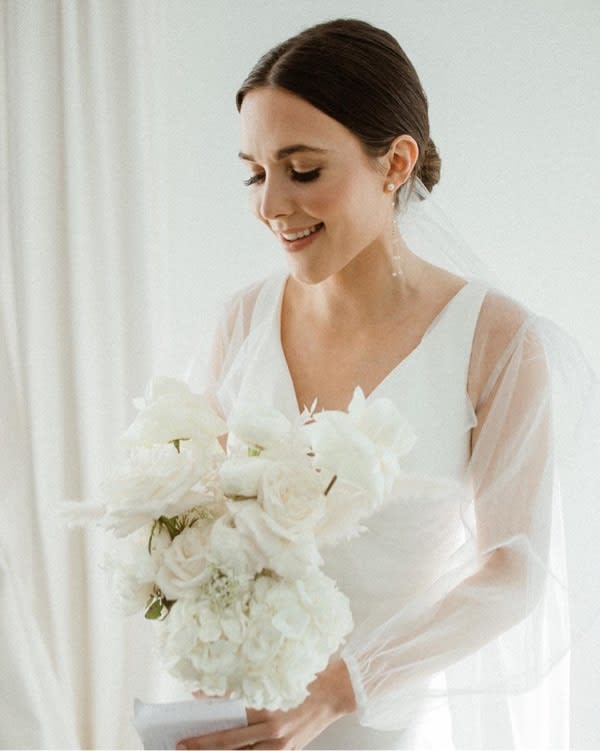
Photo by @katehensphillips.
How to Pay for a Wedding
Once you’ve budgeted and saved, you’ll still need to make wedding payments. You can pay for your wedding through:
1. Savings & Current Income
Whether this is your wedding bank account you made earlier, or a separate checking or savings account, having savings set aside before your wedding will make paying for your wedding that much easier.
Subtract already-spoken-for savings amounts (like emergency funds) from your total balance in the bank and that's how much you could potentially put towards the wedding.
Then, after you've paid your monthly recurring expenses (like rent or mortgage payments, car insurance, student loan payments, etc.), set aside up to 10 percent of your earnings each month to put towards the wedding.
2. Loans or Credit
If you're looking to get started right away, you can get a loan or open a credit card account to help pay for your wedding. However, only take out what you can afford to pay back easily in the future. A wedding should not send you and your partner into years of debt. A good rule of thumb to follow is to never charge any wedding expenses that you can't pay off in 30 days using the money from your wedding fund.
Since wedding planning is typically not an emergency situation where one must borrow money immediately when planning their nuptials, it's worth taking time before applying for either type of loan or credit card account so that you have time to compare rates between several different institutions. Just avoid signing up for more than one card because that can ultimately hurt your credit score.
3. Relatives
Some couples might be lucky enough to receive monetary gifts from family members to help pay for the wedding. If this is the case for you, make sure to have early conversations on how much to expect so that you’re not going over budget.
Some couples are also creating “honeymoon funds” or “new home funds” instead of physical gifts at their wedding, which can offset the cost. However, do not rely on gifts when you’re making your wedding budget.
Saving for a Wedding: Tips & FAQs
1. Budget for hidden costs
While you can budget out for flowers and caterers and more, there are also hidden costs that can pop up throughout the wedding planning process that you don’t have a specific spot in your budget for. Add 10 percent to your wedding budget to cushion for items you might forget or just not anticipate in advance, like cake-cutting costs or renting a last-minute tent. If you don't use it all, that’s great!
To reduce these costs, start planning as soon as possible, and have in depth conversations with all of your vendors (is tip included in their pricing?), as well as understand what you will and won’t be providing for guests (transportation to and from venues?)
Read more in this guide on what you should ask your wedding vendors, as well as some important wedding etiquette tips.
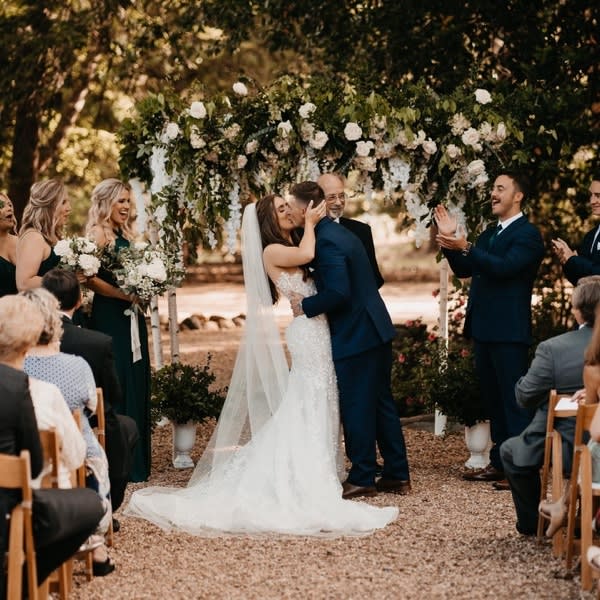
Photo by @william_avery_photography.
2. DIY doesn't always equal savings
While you might be able to save money by making your own favors, DIY can sometimes cost more than you think. Make sure to carefully plan out both the monetary and time costs of DIY projects before getting started.
3. Consider your guests
While it’s important to host an affordable wedding, it’s also important to consider your guests in choices you make for the location, day of the week, and timing of the event.

Photo by @allentsaiphoto.
4. Increase your income
If your finances are tight and you're having trouble saving, you can try to increase your income by:
- Side jobs: Wedding planning is busy, but making a little extra time in your week to make some additional income can help you afford the wedding you’re hoping for.
- Selling: With a wedding comes lots of new gifts, so why not go through your current home and clothing items, and see what you can sell? Online forums like eBay and Poshmark make it easier to make some money items you no longer use that someone else will love!
- Requesting a raise: If you’ve been putting off the raise you’ve been waiting for, now might be the time to request it. Any raise you get you can put that additional money towards wedding costs.
5. Skip tradition
You can also save money by skipping some common wedding traditions. Often, couples can be surprised by the cost of wedding cakes. You can save money by opting for a simple one-tier cake or a different option like cupcakes or a candy bar.
Not into a videographer? That’s fine! Prefer candles to florals? Probably don’t need a florist. Making these decisions means you’ll have a beautiful day you love that you also can afford.
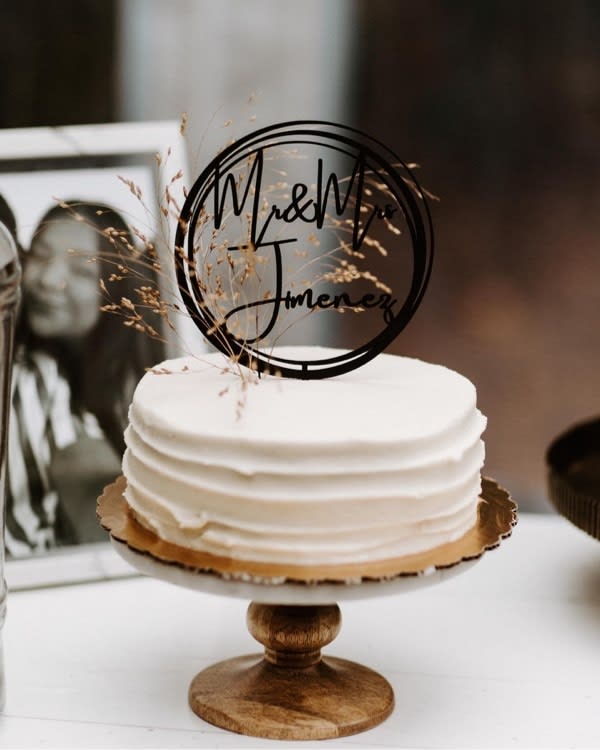
Photo by @marianateyphoto.
6. Be realistic
To create a realistic wedding day timeline and budget, you need to be honest about your expectations. You know that you want the wedding of your dreams, but what is it going to cost? What can you realistically afford? How much time do you have available to plan your day? Where will the ceremony take place and when should it begin—and what kind of style do you envision for this celebration?
Be realistic. Be honest with yourself when answering these questions; don't just make up numbers because they seem right or because someone else has done something similar. Your answers will lead directly into developing a budget that works best for both parties involved.
Ready to get started? Build your wedding budget today to start saving for your wedding!
















